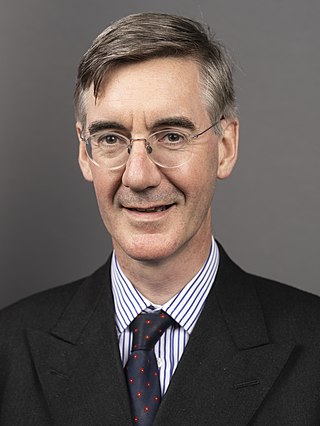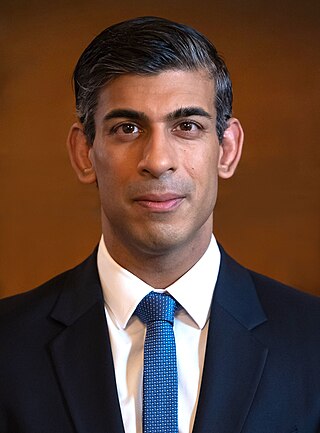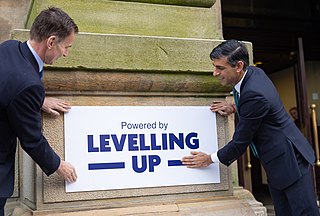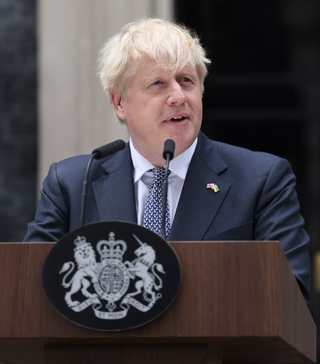Related Research Articles

Michael Andrew Gove is a British politician serving as Secretary of State for Levelling Up, Housing and Communities and Minister for Intergovernmental Relations since October 2022, having previously held both offices from September 2021 to July 2022. He has been Member of Parliament (MP) for Surrey Heath since 2005. A member of the Conservative Party, he has also served in various Cabinet positions under Prime Ministers Cameron, May, Johnson and Sunak. Gove has twice run to become Leader of the Conservative Party, in 2016 and 2019, finishing in third place on both occasions. Apart from a period of just over one year, he has served continually in the Cabinet since 2010.

Siv Jensen is a Norwegian who served as the leader of the Progress Party from 2006 to 2021. She also held the position as Minister of Finance from 2013 to 2020 in the Solberg Cabinet. She was also a member of the Norwegian parliament from Oslo from 1997 to 2021.

Sir Jacob William Rees-Mogg is a British politician serving as the Member of Parliament (MP) for North East Somerset since 2010. Now a backbencher, he served as Leader of the House of Commons and Lord President of the Council from 2019 to 2022, Minister of State for Brexit Opportunities and Government Efficiency from February to September 2022 and Secretary of State for Business, Energy and Industrial Strategy from September to October 2022. A member of the Conservative Party, Rees-Mogg previously chaired the eurosceptic European Research Group (ERG) from 2018 to 2019 and has been associated with socially conservative views.

Alexander Boris de Pfeffel Johnson is a British politician and writer who served as Prime Minister of the United Kingdom and Leader of the Conservative Party from 2019 to 2022. He previously served as Foreign Secretary from 2016 to 2018 and as Mayor of London from 2008 to 2016. He was Member of Parliament (MP) for Uxbridge and South Ruislip from 2015 to 2023, having previously been MP for Henley from 2001 to 2008.

Nicola Ann Morgan, Baroness Morgan of Cotes, is a British politician who served as Secretary of State for Education and Minister for Women and Equalities from 2014 to 2016 and Secretary of State for Digital, Culture, Media and Sport from 2019 to 2020. She was the first woman to chair the Treasury Select Committee. A member of the Conservative Party, she was Member of Parliament (MP) for Loughborough from 2010 to 2019.

Melvyn John Stride is a British politician who has served as Secretary of State for Work and Pensions since October 2022. He previously served in the May Government as Financial Secretary to the Treasury and Paymaster General from 2017 to 2019 and as Leader of the House of Commons and Lord President of the Council from May to July 2019. He also served as Chair of the Treasury Select Committee from 2019 to 2022. A member of the Conservative Party, he has been the Member of Parliament (MP) for Central Devon since 2010.

Steven John Baker is a British politician serving as Minister of State for Northern Ireland since 2022. He is a former Royal Air Force engineer, consultant and bank worker, who was chair of the European Research Group (ERG) from 2016 to 2017 and 2019 to 2020. A member of the Conservative Party, he has been the Member of Parliament (MP) for Wycombe in Buckinghamshire since 2010.

Rishi Sunak is a British politician who has served as Prime Minister of the United Kingdom and Leader of the Conservative Party since 2022. The first British Asian prime minister, he previously held two cabinet positions under Boris Johnson, lastly as Chancellor of the Exchequer from 2020 to 2022. Sunak has been Member of Parliament (MP) for Richmond (Yorks) since 2015.

The 2019 United Kingdom general election was held on Thursday 12 December 2019 to elect members of the House of Commons. The Conservative Party won a landslide victory with a majority of 80 seats, a net gain of 48, on 43.6% of the popular vote, the highest percentage for any party since the 1979 United Kingdom general election.

The 2016 Conservative Party leadership election was held due to Prime Minister David Cameron's resignation as party leader. He had resigned after losing the national referendum to leave the European Union. Cameron, who supported Britain's continued membership of the EU, announced his resignation on 24 June, saying that he would step down by October. Theresa May won the contest on 11 July 2016, after the withdrawal of Andrea Leadsom left her as the sole candidate.

Vote Leave was a campaigning organisation that supported a "Leave" vote in the 2016 United Kingdom European Union membership referendum. On 13 April 2016 it was designated by the Electoral Commission as the official campaign in favour of leaving the European Union in the Referendum.

The 2019 Conservative Party leadership election was triggered when Theresa May announced on 24 May 2019 that she would resign as leader of the Conservative Party on 7 June and as prime minister of the United Kingdom once a successor had been elected. Nominations opened on 10 June; 10 candidates were nominated. The first ballot of members of Parliament (MPs) took place on 13 June, with exhaustive ballots of MPs also taking place on 18, 19 and 20 June, reducing the candidates to two. The general membership of the party elected the leader by postal ballot; the result was announced on 23 July, with Boris Johnson being elected with almost twice as many votes as his opponent Jeremy Hunt.
Allegations of Islamophobia in the UK Conservative Party have been made, including against senior politicians, such as Boris Johnson, Michael Gove and Zac Goldsmith.
Since the foundation of the Conservative Party in 1834, there has been a variety of both proven and unproven anti-semitic accusations linked to Conservative party leaders and other party figures.
Opinion polling for the 2019 Conservative Party leadership election had taken place since 2017. Conservative Party Leader and Prime Minister Theresa May announced on 24 May 2019 that she would resign as leader on 7 June 2019, officially announcing the start of the 2019 Conservative Party leadership election.

The February 2020 Scottish Conservative Party leadership election was the fourth internal party election to elect the next leader of the Scottish Conservatives, part of the British Conservative Party and the second-largest political party in the devolved Scottish Parliament. Ruth Davidson, who won the previous leadership election in 2011, resigned on 29 August 2019. Two candidates contested the election: Jackson Carlaw MSP, who served as the Scottish Conservatives' interim leader, and Michelle Ballantyne MSP. Carlaw was seen as the favourite in the contest, and won the endorsement of most of the party's MSPs and MPs. Carlaw won the election on 14 February 2020, winning more than three-quarters of the votes of party members.

"Levelling up" is a political policy first articulated in the 2019 Conservative Party manifesto that aims to reduce the imbalances, primarily economic, between areas and social groups across the United Kingdom. It seeks to do so without acting to the detriment of prosperous areas, such as much of South East England. A white paper for the policy was published by Boris Johnson's government on 2 February 2022, and has been continued by Rishi Sunak's government. The policy is overseen by the Department for Levelling Up, Housing and Communities, and the incumbent Secretary of State is Michael Gove.
The July–September 2022 Conservative Party leadership election was triggered by Boris Johnson's announcement on 7 July 2022 that he would resign as Leader of the Conservative Party and Prime Minister of the United Kingdom, following a series of political controversies.

In early July 2022, 62 of the United Kingdom's 179 government ministers, parliamentary private secretaries, trade envoys, and party vice-chairmen resigned from their positions in the second administration formed by Boris Johnson as Prime Minister, culminating in Johnson's resignation on 7 July. Johnson's premiership had been considered in danger for months after several scandals, but it was the Chris Pincher scandal that was identified to have spurred on the resignations. Considered the "last straw" for the Prime Minister, the scandal arose after it was revealed that Johnson had promoted his Deputy Chief Government Whip Chris Pincher, who was publicly facing multiple allegations of sexual assault, to the position despite knowing of the allegations beforehand.

Rishi Sunak's tenure as Prime Minister of the United Kingdom began on 25 October 2022 when he accepted an invitation from King Charles III to form a government, succeeding Liz Truss. He is the first British Asian to hold the office of prime minister. As prime minister, Sunak is also serving as First Lord of the Treasury, Minister for the Civil Service, and Minister for the Union.
References
- ↑ Browning, Skylar (31 August 2012). "History of debating an empty chair dates back to a Montanan (of course)". missoulanews.bigskypress.com. Archived from the original on 9 September 2015. Retrieved 17 October 2023.
- 1 2 Schultz, Colin (31 August 2012). "The Long History of Americans Debating Empty Chairs". Smithsonian . Archived from the original on 9 June 2015.
- ↑ Carroll, Mickey (13 September 2014). "Last time a Cuomo debated debating". NY Daily News. Retrieved 22 May 2016.
- ↑ Vallely, Paul (24 October 2011). "Paul Vallely: God knows why Dawkins won't show". Independent.co.uk . Retrieved 17 October 2023.
- ↑ "Empty chair debates". nashobavalleyvoice.com. 12 April 2013. Retrieved 17 October 2023.
- ↑ "Guidelines for Debates and Forums". League of Women Voters, Wisconsin. 2014. Archived from the original on 25 February 2017.
- ↑ "Watch as Sky News presenter Kay Burley 'empty chairs' Tory party chairman". The Scotsman . 6 November 2019. Retrieved 6 November 2019.
- ↑ "Conservatives and Channel 4 clash after Michael Gove turned away from climate debate". ITV News. 29 November 2019. Retrieved 29 November 2019.
- ↑ Stone, Jon (28 November 2019). "Boris Johnson to be replaced with melting ice sculpture after dodging climate change TV debate". The Independent. Retrieved 29 November 2019.